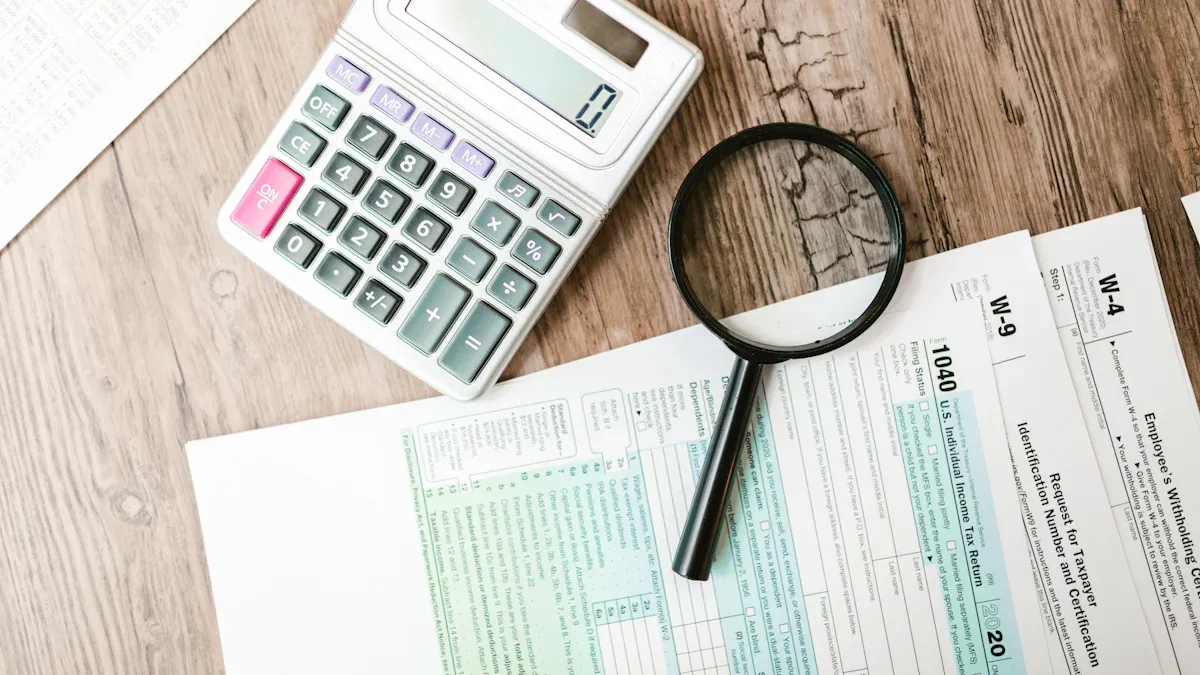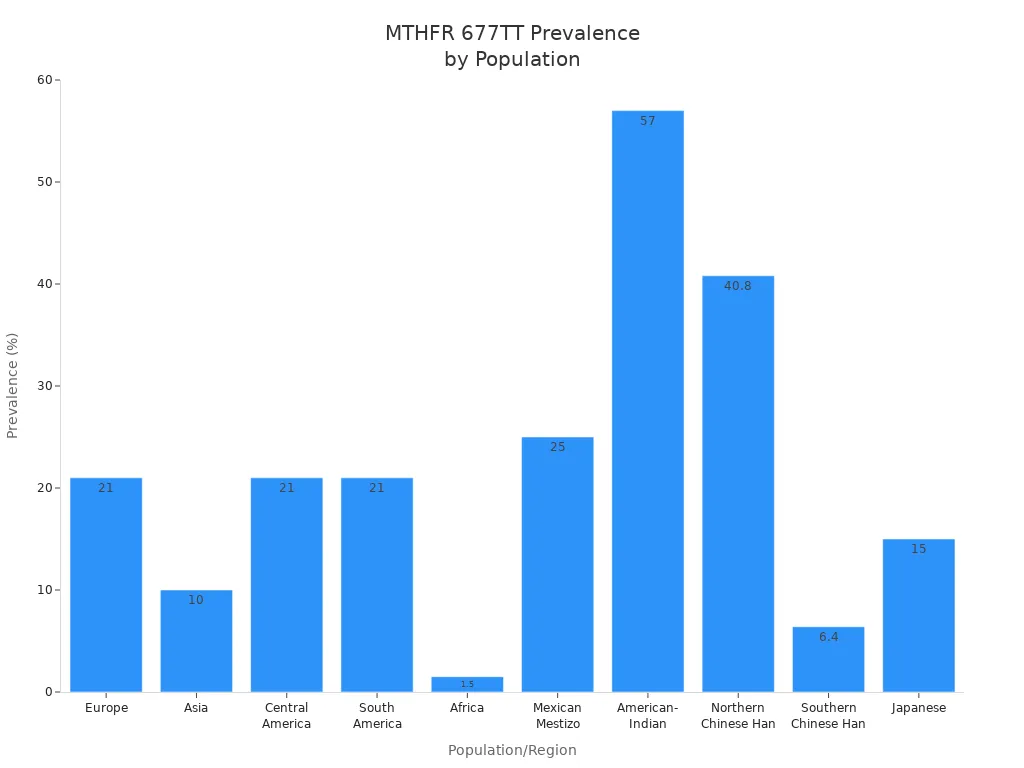Understanding the Optimal L-Methylfolate Dose for Wellness
Table of Contents

You may find that the optimal l-methylfolate dose for depression and mental wellness is 15 mg daily, as supported by clinical studies. Many people use l-methylfolate as an add-on to other treatments, and about 90% report following their prescribed dose. You should always work with your doctor to decide your dose and adjust it slowly. L-methylfolate supplementation can improve symptoms, but you need to watch for side effects like nausea or changes in sleep. Always use this supplement under medical supervision.
L-Methylfolate and Mental Health

What Is L-Methylfolate?
You may wonder what makes l-methylfolate different from other forms of folate. L-methylfolate is the active form of vitamin B9 that your body uses right away. Unlike folic acid, which needs several steps to become useful, l-methylfolate is ready for your cells to absorb. This means you get the benefits faster and more efficiently. People with certain genetic changes, like MTHFR mutations, often have trouble converting folic acid. You can see how l-methylfolate compares to folic acid in the table below:
| Characteristic | L-Methylfolate | Folic Acid |
|---|---|---|
| Form | Active form of folate | Synthetic form of vitamin B9 |
| Absorption | Well absorbed, does not require conversion | Requires multiple conversions |
| Effectiveness | More effective for individuals with genetic mutations | Can inhibit absorption of natural folates and vitamin B12 |
L-methylfolate supports many important functions in your body. You need it for DNA synthesis, cell growth, and methylation. It also helps convert homocysteine to methionine, which keeps your cells healthy.
How It Supports Mental Wellness
You play a key role in your own mental health. L-methylfolate helps your brain make neurotransmitters like serotonin, dopamine, and norepinephrine. These chemicals control your mood and energy. If you do not have enough l-methylfolate, your brain may struggle to produce these neurotransmitters. This can lead to problems like depression or anxiety.
- L-methylfolate acts as a cofactor in making serotonin, dopamine, and norepinephrine.
- Low levels of l-methylfolate can cause poor neurotransmitter production, which affects your mood.
- Supplementing with l-methylfolate may improve symptoms of depression, especially if you have low folate levels.
- You may notice better mood and clearer thinking when your body gets enough l-methylfolate.
- Studies show that l-methylfolate can help people with depression who do not respond well to standard treatments.
Tip: If you struggle with depression or mood changes, ask your doctor about l-methylfolate. It is usually well tolerated and may offer benefits for your mental wellness.
L-methylfolate supports your mood by helping your brain work better. You may find that your mood improves, your energy increases, and your symptoms of depression lessen when you use the right dose.
Optimal L-Methylfolate Dose for Depression
Clinical Evidence and Guidelines
You may want to know what experts say about the optimal l-methylfolate dose for depression. Most clinical guidelines recommend a daily dose of 15 mg for adults with depression. This dose is much higher than the standard dietary allowance of folate, which is only 400-800 mcg. You can see how this dose compares to typical recommendations:
- Doctors often prescribe 15 mg daily for depression.
- This dose supports better mood and helps with treatment-resistant depression.
- You may need this higher dose if you have mdd or severe depressive symptoms.
Researchers have studied l-methylfolate in people with depression who do not respond well to other treatments. The results show that the optimal l-methylfolate dose improves mood and increases remission rates. You can look at the table below to see how l-methylfolate works in clinical trials:
| Study Type | Treatment | Response Rate (%) | Mean HAM-D Reduction | Full Recovery Rate (%) |
|---|---|---|---|---|
| RCT 1 | LMF 15 mg/day + SSRI | 32.3 | -5.6 | 38 |
| RCT 2 | LMF 15 mg/day + SSRI | 32.3 | -5.6 | 38 |
| Observational Study | LMF | 67.9 | -8.5 | N/A |
You can see that people who use the optimal l-methylfolate dose have better treatment efficacy and higher remission rates. Many patients with mdd and treatment-resistant depression show improvement in mood and depressive symptoms.
Note: You should always talk to your doctor before starting l-methylfolate. Your doctor can help you find the right dose for your depression symptoms.
Typical Dose Ranges
You may wonder how much l-methylfolate you should take for depression. Most studies and guidelines suggest a range between 7.5 mg and 15 mg daily. The optimal l-methylfolate dose for depression is usually 15 mg, but some people start with lower doses. You can see the typical dose ranges in the table below:
| Dose Range (mg/day) | Use Case |
|---|---|
| 7.5 | Mild depressive symptoms |
| 10 | Moderate depression |
| 15 | Severe or treatment-resistant depression |
| Up to 30 | Maximum safe dose (rare cases) |
You may need a higher dose if you have treatment-resistant depression or mdd. Some doctors use high-dose l-methylfolate for people who do not respond to standard treatments. Most people do not need more than 15 mg daily. The maximum safe dose is 30 mg per day, but you should only use this under medical supervision.
You can expect better mood and higher remission rates when you use the optimal l-methylfolate dose. Many people with depression symptoms notice improvement after a few weeks.
Starting and Adjusting Dose
You should start l-methylfolate slowly and increase your dose as needed. Most doctors recommend starting with 5 mg daily for three weeks. If you do not see improvement in your mood or depressive symptoms, your doctor may increase your dose to 10 mg for another three weeks. After that, you may move up to the optimal l-methylfolate dose of 15 mg daily. You can see the recommended schedule below:
| Starting Dose | Duration |
|---|---|
| 5mg | 3 weeks |
| 10mg | 3 weeks |
| 15mg | thereafter |
You should watch for changes in your mood and depression symptoms as you adjust your dose. Your doctor will monitor your progress and check for side effects. You may need to stay at a lower dose if you have mild depressive symptoms or if you respond well to treatment. If you have mdd or treatment-resistant depression, you may need the full 15 mg daily.
- Start with 5 mg daily.
- Increase to 10 mg after three weeks if needed.
- Move to 15 mg daily for the optimal l-methylfolate dose.
- Do not exceed 30 mg per day unless your doctor tells you.
You should always work with your healthcare provider to find the best dose for your depression. Your doctor will help you track your mood, remission rates, and depressive symptoms. You may need to adjust your dose based on your response and any side effects.
Tip: Keep a journal of your mood and depression symptoms. Share this with your doctor to help guide your treatment.
Factors Affecting Your Dose

Genetics and MTHFR
Your genes can change how your body uses l-methylfolate. The MTHFR gene helps your body turn folate from food into its active form. If you have a common MTHFR variant, like C677T or A1298C, you may not make enough active folate. This can affect your mood and how you respond to depression management. Many people with these gene changes need more l-methylfolate to help their bodies work better.
If you have reduced MTHFR activity, you may benefit from l-methylfolate supplements. These can help your body make the folate it needs for brain health and depression management.
Here is a table showing how different MTHFR variants affect folate needs:
| MTHFR Variant | Folate Requirement Compared to Normal |
|---|---|
| A1298 heterozygous (1 copy) | Slightly increased |
| A1298 homozygous (2 copies) | Twice as much |
| C677T heterozygous (1 copy) | Increased |
| C677T homozygous (2 copies) | Three times as much |
| Compound heterozygous | Same as C677T homozygous |
Many people around the world have these gene changes. The chart below shows how common the MTHFR 677TT genotype is in different regions:

Age and Health Status
Your age and health can change how much l-methylfolate you need for depression management. Young people and older adults may process folate differently. If you have health problems, you may need to adjust your dose. Some conditions, like B12 deficiency or seizure disorders, can make l-methylfolate less safe. You should talk to your doctor if you have any of these health issues.
| Health Condition | Description |
|---|---|
| Allergic Reaction to L-methylfolate | Avoid if allergic to l-methylfolate or its components due to potential severe reactions. |
| Pernicious Anemia or Other B12 Deficiencies | L-methylfolate can mask B12 deficiency symptoms, which can lead to nerve damage if untreated. |
| Seizure Disorders | May lower seizure threshold; consult a healthcare provider if you have epilepsy or similar conditions. |
Always let your doctor know about your health history before starting l-methylfolate for depression.
Medications and Interactions
Some medicines can change how l-methylfolate works in your body. If you take medicine for seizures, cancer, or other conditions, you may need a different dose for depression management. These medicines can lower the amount of active folate in your body or change how you respond to treatment.
Common medicines that interact with l-methylfolate include:
- capecitabine
- carbamazepine
- methotrexate
- phenytoin
- valproic acid
- lamotrigine
- phenobarbital
- sulfasalazine
If you use l-methylfolate with antidepressants, you may see better results in depression management. Studies show that combining l-methylfolate with antidepressants can improve symptoms and is considered safe. You should always ask your doctor before mixing medicines.
Tip: Make a list of all your medicines and share it with your doctor. This helps you avoid problems and get the best results for depression.
Safe Use and Monitoring
How to Start L-Methylfolate
You can begin supplementation with l-methylfolate by following a step-by-step approach. Your doctor may recommend starting with a low dose and increasing it slowly. This helps your body adjust and lowers the chance of side effects. Here is a simple guide:
- Talk to your healthcare provider before you start supplementation.
- Begin with a low dose, such as 5 mg daily.
- Increase the dose every few weeks if you do not see improvement in your depression symptoms.
- Do not exceed the recommended maximum dose unless your doctor says it is safe.
- Keep track of your mood and any changes during supplementation.
Tip: Write down your feelings and symptoms each week. This helps you and your doctor see how supplementation with l-methylfolate affects your depression.
Signs of Effectiveness
You may wonder how to know if supplementation is working for your depression. Most people notice benefits after several weeks. Some signs show that l-methylfolate is helping:
- You feel less sad or hopeless.
- Your energy improves.
- You sleep better.
- You find it easier to focus.
Studies show that patients who take 15 mg of l-methylfolate daily for 30 days have lower depression scores. Many people see a 50% drop in their symptoms after about three months of supplementation. Over half of those who did not respond at first later achieved remission.
| Evidence Type | Description |
|---|---|
| Initial Effects | It may take several weeks to notice benefits from supplementation. |
| Average Improvement | Most people report significant improvement in depression after 95 days. |
Side Effects to Watch For
You need to watch for side effects during supplementation with l-methylfolate. Most side effects are mild, but some can be serious. Common minor side effects include headache, nausea, or trouble sleeping. Serious side effects are rare but need quick medical attention.
| Type of Side Effect | Description |
|---|---|
| Serious | Rash, hives, itching, trouble breathing, or swelling of the face or throat. |
| Other | Minor issues like headache or stomach upset. |
If you notice any of these warning signs, stop supplementation and call your doctor:
- Rash, hives, or itching
- Red, swollen, or blistered skin
- Wheezing or tightness in your chest
- Trouble breathing or swallowing
- Swelling of your mouth, lips, or throat
Note: Always tell your doctor about any new symptoms during supplementation. Quick action keeps you safe and helps you get the most benefit for your depression.
You have learned that the most effective l-methylfolate dose for depression is 15 mg daily. Clinical trials show this dose works better than lower amounts for improving depression symptoms. You should always work with your doctor, since l-methylfolate is a medical food and needs supervision. Your body may need a different dose based on genetics or health. Individualized dosing helps you get the best results for depression. You can expect safe use and long-term benefits, even if you do not respond right away. L-methylfolate supports your brain’s ability to make neurotransmitters, which can help you feel better and manage depression.
| Dosing | Effectiveness |
|---|---|
| 7.5 mg | Less effective |
| 15 mg | More effective |
| Monotherapy | Effective in patients with MTHFR deficiency |
- Over 6,000 patients have joined studies on l-methylfolate for depression.
- The 15 mg dose gives the highest improvement in depression.
- You may see benefits even if you have treatment-resistant depression.
You can take steps to monitor your mood and share changes with your healthcare provider. L-methylfolate offers hope for better mental wellness and a brighter outlook.
FAQ
What is the best time of day to take l-methylfolate?
You can take l-methylfolate at any time. Many people choose the morning. Try to take it at the same time each day. This helps you remember your dose.
Can you take l-methylfolate with food?
Yes, you can take l-methylfolate with or without food. Some people find it easier on the stomach when taken with a meal.
How long does it take to feel better after starting l-methylfolate?
Most people notice changes in mood or energy after a few weeks. Some may need up to three months. Track your symptoms and share them with your doctor.
Is l-methylfolate safe for long-term use?
Studies show l-methylfolate is safe for long-term use when you follow your doctor’s advice. Always report any new symptoms or side effects.
What should you do if you miss a dose?
- Take your missed dose as soon as you remember.
- If it is almost time for your next dose, skip the missed one.
- Do not double up on doses.

Poseidon
Master of Nutritional Epidemiology, University of Copenhagen, Herbal Functional Nutrition Researcher
Focus: The scientific application of natural active ingredients such as Tongo Ali, Horny Goat Weed, and Maca to sexual health and metabolic regulation.
Core Focus:
Men: Use a combination of Tongo Ali (an energizing factor) + Maca (an energy reserve) to improve low energy and fluctuating libido.
Women: Use a combination of Horny Goat Weed (a gentle regulator) + Maca (a nutritional synergist) to alleviate low libido and hormonal imbalances.
Stressed/Middle-Aged Adults: This triple-ingredient synergy supports metabolism, physical strength, and intimacy.
Product Concept:
Based on traditional applications and modern research (e.g., Tongo Ali promotes testosterone-enhancing enzyme activity, and icariin provides gentle regulation), we preserve core active ingredients and eschew conceptual packaging—using natural ingredients to address specific needs.
Simply put: I'm a nutritionist who understands "herbal actives." I use scientifically proven ingredients like Tongo Ali, Epimedium, and Maca to help you make "sexual health" and "nutritional support" a daily routine.
